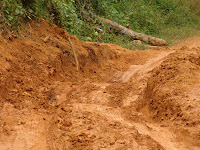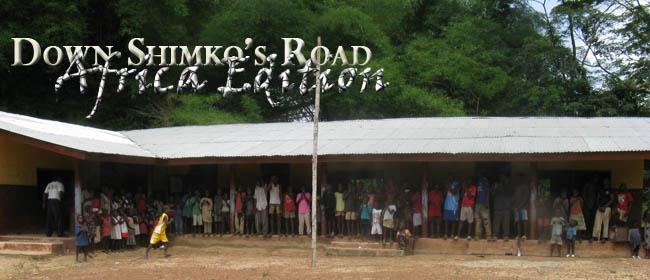It's hard to visit new places and new people when you are not in the best health. It's even harder when you know this is your only chance.
Today, I have a slight cold. Nothing too severe and it hasn't really bothered me that much. My left eye, however, is completely shot. I have kept my contacts in all week without taking them out. I don't have a mirror and I know my hands are not as clean as I normally would have them. Last night, however, my eye started aching to the point that I couldn't sleep and just had to take the contacts out.
This morning, however, the eye is very red and irritated. Sunlight is my enemy, which makes it hard to function with both eyes when you are outside all day. Hopefully it will go away soon. I don't want the rest of my trip to be hampered by this setback.
I did not let my eye deter our plans to visit Pyne Town today, however. It was my only opportunity to visit Sinoe County, which is a more rural and poorer county than Grand Gedeh, where I have been staying this week. I was able to see most of the trip to Pyne Town, fortunately.
 The road was in worse shape than the one we took last week, with deep ditches from the wet season that just ended. At times it appeared we were not going to make it through to Pyne Town because of these obstacles. There was one spot where the road was virtually washed away, with a small ditch to pass through. You could tell a number of cars and motorbikes tried to pass through with varying degrees of success.
The road was in worse shape than the one we took last week, with deep ditches from the wet season that just ended. At times it appeared we were not going to make it through to Pyne Town because of these obstacles. There was one spot where the road was virtually washed away, with a small ditch to pass through. You could tell a number of cars and motorbikes tried to pass through with varying degrees of success.The driver, whose car was in much better shape than the one we took to Zleh Town, decided to slow down and carefully maneuver through the small passageway. This was mildly successful as we were able to make it halfway through the trial before he wedged the little Nissan between two mud walls. At this point Pastor Dweh and Joe got out, telling me to stay in the car, and tried to push the car through. When this proved unsuccessful, I decided it was pointless for the "guest" to stay in the car and proceeded to help push the car, as well. Either my additional muscle or the less weight in the car, probably a combination of both, proved to be the trick as we were able to make it through and ride on.
The rest of the road to Pyne Town was a denser jungle than what I've been through previously. The road narrowed as we were surrounded by the jungle, with its high-rising trees and exotic wildlife, including birds of all sorts.
 When we arrived in Pyne Town, I understood why Joe had mentioned it was one of the harder places for the schools to succeed. This was a small village, with few buildings apart from the homes. Where most of the people in Zwedru and Monrovia had cell phones for communication, the villagers here used word of mouth to spread word. To make matters worse for the school, the Lutheran Church of Liberia had promised the necessary materials to build the church but failed to deliver on the promise. Joe said it came from a lack of funding and a need to spend the money in other villages. Word spread fairly quickly of our arrival. By the time we had settled down in the main room of the pastor's home, the school children crowded the entrance as well as the open window. They kept creating distractions, fighting to catch a glimpse of the "white man," while we met with the teachers of a school without a school building. They had hoped to use the new church building as a school, but without the materials from the Church there is little hope for that plan to succeed. Instead, they use whatever building they can to teach the students.
When we arrived in Pyne Town, I understood why Joe had mentioned it was one of the harder places for the schools to succeed. This was a small village, with few buildings apart from the homes. Where most of the people in Zwedru and Monrovia had cell phones for communication, the villagers here used word of mouth to spread word. To make matters worse for the school, the Lutheran Church of Liberia had promised the necessary materials to build the church but failed to deliver on the promise. Joe said it came from a lack of funding and a need to spend the money in other villages. Word spread fairly quickly of our arrival. By the time we had settled down in the main room of the pastor's home, the school children crowded the entrance as well as the open window. They kept creating distractions, fighting to catch a glimpse of the "white man," while we met with the teachers of a school without a school building. They had hoped to use the new church building as a school, but without the materials from the Church there is little hope for that plan to succeed. Instead, they use whatever building they can to teach the students. It is unfortunate that money has become so scarce throughout the country that even non-profit organizations like the Lutheran Church has to resort to robbing Peter to pay Paul. You cannot fault the Church for shifting money from one area to pay off other areas when the men and women running the organization are doing nothing different than any other, including the United Nations. Instead, the churches left without resources search for other means to fund themselves. While this proves successful in cities like Zwedru, villages like Pyne Town cannot possibly function without external aid. This is why groups like the Liberian Children's Ministry proves to be a great asset. Without Joe, there would be no education for the kids in this small village, and without the help from Americans gifting to the LCM, there would be no school building in the future for Pyne Town. Of course, I'm not sure how grateful the villagers were on hearing of the gift since most of the conversation was in Krahn, leaving me to listen to Joe interpret what was said.
It is unfortunate that money has become so scarce throughout the country that even non-profit organizations like the Lutheran Church has to resort to robbing Peter to pay Paul. You cannot fault the Church for shifting money from one area to pay off other areas when the men and women running the organization are doing nothing different than any other, including the United Nations. Instead, the churches left without resources search for other means to fund themselves. While this proves successful in cities like Zwedru, villages like Pyne Town cannot possibly function without external aid. This is why groups like the Liberian Children's Ministry proves to be a great asset. Without Joe, there would be no education for the kids in this small village, and without the help from Americans gifting to the LCM, there would be no school building in the future for Pyne Town. Of course, I'm not sure how grateful the villagers were on hearing of the gift since most of the conversation was in Krahn, leaving me to listen to Joe interpret what was said.
The rest of the trip was much like my visit to the other schools; the children all wanted to touch me or shake my hand and everyone wanted their picture taken (this time I used the small viewfinder as the sunlight filtered through it aided my eye). There was one major difference from my trip to Zleh Town, though. Instead of preparing a meal for us to eat, because they were unsure of when we would arrive, they gave me a gift. I am now the proud(?) owner of a chicken. I can say it was the first time I have received livestock as a gift - or for any other reason.
 The trip back was as eventful as the trip to Pyne Town, with the car wedged in the same mud at the same point in the road-turned-ditch. As night fell and the week ended, my eye was improving and the rain moved into town. It was no sprinkle-turned-shower, nor was it a steady rainfall. It was a torrential downpour with strong winds blowing the rain vertically. I just stood in the doorway to the house, watching the rain as the metal roof transformed into nature's drum. Now I understand why Liberians prefer metal roofs to thatch. The rainstorm lifts the thatch roofs and the water just soaks through, leaving a less-than-ideal situation.
The trip back was as eventful as the trip to Pyne Town, with the car wedged in the same mud at the same point in the road-turned-ditch. As night fell and the week ended, my eye was improving and the rain moved into town. It was no sprinkle-turned-shower, nor was it a steady rainfall. It was a torrential downpour with strong winds blowing the rain vertically. I just stood in the doorway to the house, watching the rain as the metal roof transformed into nature's drum. Now I understand why Liberians prefer metal roofs to thatch. The rainstorm lifts the thatch roofs and the water just soaks through, leaving a less-than-ideal situation.After the rain passed through, about an hour later, Pastor Dweh turned on the generator and prepared the only television set I've seen outside Monrovia. On weekends, the pastor will move the tv to the front porch and invite the neighborhood over to watch a film. Because of the rain, tonight's movie was indoors for the family. We were treated to The 7th Voyage of Sinbad, a 1958 film, with Arabic subtitles. How fitting, considering the film's topic.
 My time is almost finished in Zwedru and we plan to drive back to Monrovia on Sunday after church. It is amazing to think the week is already completed, but I know I will never forget its events. This has definitely been one of the most amazing weeks I've ever had, with so many memories and experiences that I cannot possibly share them all when I return. Maybe I will run out stories from Liberia one day, but I can only imagine it will be months down the road.
My time is almost finished in Zwedru and we plan to drive back to Monrovia on Sunday after church. It is amazing to think the week is already completed, but I know I will never forget its events. This has definitely been one of the most amazing weeks I've ever had, with so many memories and experiences that I cannot possibly share them all when I return. Maybe I will run out stories from Liberia one day, but I can only imagine it will be months down the road.


